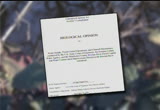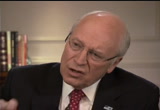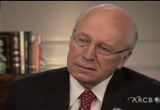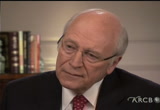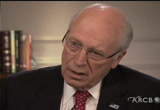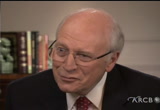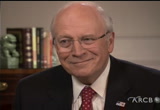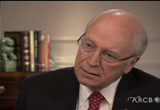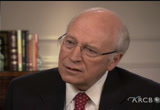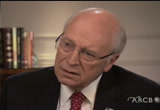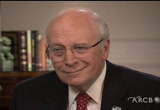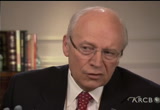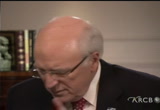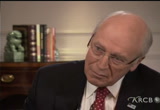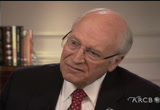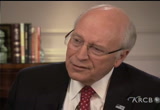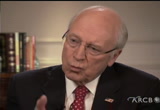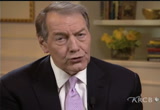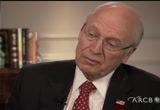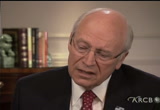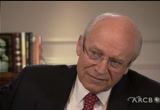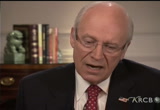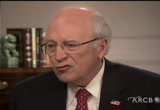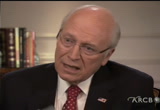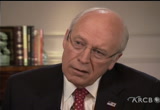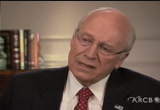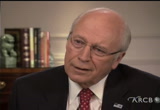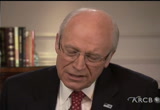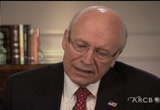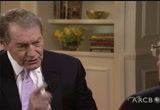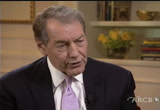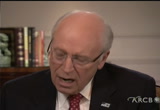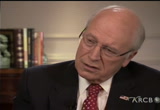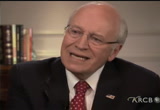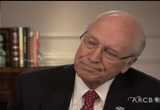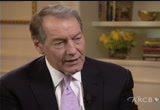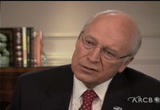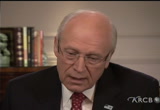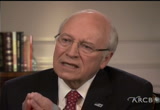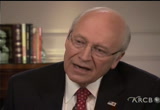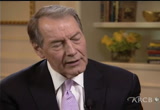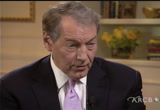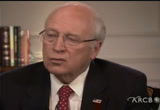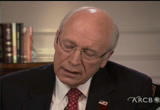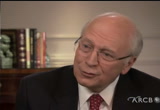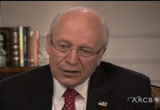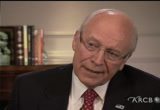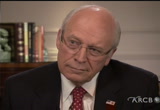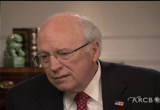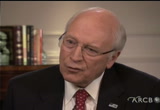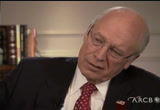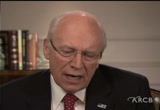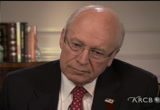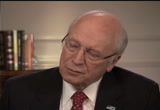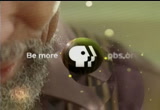tv Charlie Rose PBS February 13, 2013 11:00pm-12:00am PST
11:02 pm
is. >> rose: welcome to the program. tonight, a conversation with dick cheney. >> you know, for seven and a half years we kept the country safe from any follow on attacks, mass casualty attacks of the type of 9/11. we had good reason to believe that we were, in fact, likely to be targeted again. we did everything we could think of within the law blessed by the lawyers over in the justice department to make certain that that didn't happen again. we're in a situation now, charlie, what i worry about now, what i worried about then, is that the next attack isn't going to be guys armed with airline tickets and box cutters, it will be with chemical weapons or maybe even a nuke or just a dirty nuke, a truck full of stuff that you set off and you can spread radioactive material around the landscape. those are the kinds of attacks we have to guard against. it's not going te ju 300 people killed in one day. >> rose: cheney for the hour, next.
11:03 pm
11:04 pm
he served two terms as vice president, president george w. bush from twub two 2008. he was also secretary of defense he was also chief of staff to president gerald ford. the "washington post" has called him the most influential and powerful man ever to hold the office. he was in washington an insider. his story is a story not only of power but because of what happened after 9/11 it's a story of power and values. we begin a conversation that took place in washington. mr. vice predent, thank you very mu for taking time to see us for this conversation. how's your health? >> much, much bet, thank you. i had lived with coronary artery disease since i was 37 years old 1978. had six heart attacks and nearly everything else that you could do yourself. i had an episode of ventricular fibrillation, my heart stopped. my life was saved by an implanted defibrillator.
11:05 pm
so i've been through a lot a as of last march i got a transplant, got a new heart and it's nothing short of a miracle. it's like taking 30 years off your life. >> rose: some people said to me without that heart transplant your days were numbered. did you have sense of that? >> oh, absolutely. i'd gotten to the point where i'd done bypass and all the various procedures and i got to end stage heart failure, your heart is just no longer moving enough blood to service your vital organs and this was in july of 2010 so i went in for planned surgery. they had to do it on arch emergency basis because everything started to collapse rapidly. and that's when we implanted this -- it's called a left ventricular assist device. and that was probably the time when i was closest to death through the whole process. and once they got that pump in, they bought me 20 months and
11:06 pm
gave me opportunity to go through rehab so i could get strong enough then at the end of 20 months i got a new heart and it was a simple procedure, i was up and around the second day, i was out of the hospital in nine ys a thr wes ler i was in wyoming making political speeches. >> rose: you're a different man now? >> it really is. it's -- the doctor explained to me when it's over with you've got to understand you've been through -- we and the surgical team, this is partially a spiritual experience, it's not just surgery. >> rose: meaning? >> meaning they don't understand everything that goes on. it's not -- it's a lot of science but there's still things they don't fully understand. when you take out the old heart, in my case, it w better than twice the normal size. the donor heart that was implanted was normal size so there's a big space in there. within the matter of the day your body adjusts to all of that. it fills that empty space and
11:07 pm
the new heart fits. sometimes when you go in and after you've done a transplant you do an e.k.g. there will be a ghost e.k.g. in there, it's still a trace of the old heart as well as what what the new one's got. a lot of things like that that aren't totally understood at this point. >> ros meonsaid to mehat you're a new man but you remind them of the old dick cheney. >> uh-huh. >> that you're mellow. that you're less try dend. >> uh-huh. >> rose: do you feel that? do you know what they're talking about? >> well, my family's accusing me of becoming down right chatty on occasion. >> rose: (laughs) >> i don't sense difference that i'm a different personality. a lot of people when they ask them did your heart change your political views, for example. i guess the thing i notice most, i literally went through that process for years i anticipated that some time my -- the clock
11:08 pm
had run out on me and it would be heart disease and when maymy heart gave out that would be the end of my days. in fact, what happened was i got another chance, if you will. i went from end-stage heart failure, their death, to a new heart and i wake up every morning with a smile on my face in anticipation of a day i never expected to see. so i assume that has an impact. >> rose: i would think so. >> not so much in terms of how other people look at me but it's another way after you've been through what i've been through with the heart you don't sweat the little stuff. and everything else is little stuff. >> rose: everything else. >> yeah. >> rose: in fact, brent scrowcroft said to me at the gerald ford reunion said, "boy, i see the old dick cheney." >> (laughs) he hasn't said that toe me yet. >> rose: yet. >> brent once -- i know he once made a statement that my ugh hard nosed titu in th war
11:09 pm
on terror -- >> rose: was not the dick cheney he knew? >> not the dick cheney he knew. that i was meaner and more aggressive perhaps than he remembered. sy always thought times were different, circumstances were different, problems we had to deal with were very, very serious. >> rose: you want to be involved in the dialogue that affects the country. i read that you were in wyoming over the weekend where you have a home and you talked about the obamas team was second rate. what did you mean? >> i'm very, very concerned about what i see happening, charlie, in the national security arena. i think the administration's policies are terribly flawed. i think the damage they're doing to the department is enormous with the sequester. i think the president's performance, by my standards, in the international arena, the middle east and so forth, is worse than many of my friends and colleagues see his domestic
11:10 pm
policies. i see him heading for the exits in the middle east, getting out of iraq, no follow on agreement, geing out of afghanistan as quickly as he can. jawboning the iranians on the nuclear program. >> rose: is it a problem with the president and his policies or is it with chuck hagel, john brennan, john kerry? >> it's all the president. the president picks the people that he puts around him, too. with respect to chuck hagel and brennan, defense and c.i.a. just in the last week, their performance in front of the committees that have to confirm them has been pretty poor and that's not my judgment, that's theudgment of senators on both sides of the aisle. >> if you were in the senate would you vote against confirmation of chuck hagel? >> i would. >> rose: there are those who argue that this is personal with respect to chuck hagel because he said what he said with respect to the surge. is it for you personal? >> no, it's not personal for me.
11:11 pm
i presided or participated in the senate policy, republican policy for eight years. every tuesday when i was in town and i can't recal ever seeing chuck in one of those lunches. he wasn't sort of a very active participant as best i can tell from my perspective. i do believe that there are people that are far better qualified than he is to be -- >> rose: doesn't have the president some choice in determining who he ought to -- who he believes is the best qualified, who reflects his point of view and -- >> the senate also has the right to confirm. >> dave: john kerry. is he second-rate? >> um -- i'm not a big fan john's. i suppose some of that goes back to the '04 election. if it had been joe lieberman i would have stood up and cheered. i think joe lieberman would have been great choice to be secretary of state. >> rose: that sounds more
11:12 pm
personal. you said i'm not a big fan, it goes back to the election" rather than the point of view he has about foreign policy. >> we don't agree on very much in terms of foreign policy. when i think about the national security team that led to my comment that i thought the president was making second-rate choices, that goes to things likehage for defense, susan rice to state, brennan for c.i.a.. >> brennan worked closely, was in the c.i.a. >> john was around when we were there. he didn't play a prominent role. that's really developed since he joined this administration. >> rose: but there are -- >> but there are people that could be appoint as director of c.i.a. folks like steve cap pass. i don't know if you know him? >> rose: i know him very well. >> talented guy, enormously respected. >> rose: retired fm the c.i.a.. >> he has retired. they brought him back once before, we did. with people of that caliber available, i'm surprised you end
11:13 pm
up going with somebody like brennan. i just -- i come back to the proposition that it looks to me-- and speculative on my part, obviously, i'm not in the meetings-- that the president has made choices in part based on people who won't argue with him. who won't confront him. i think leon panetta's been a pretty good secretary. >> rose: drones. john brennan got into it at his confmati. me s thathis is an unusual situation. that the president has carried forward some of the baigs policies and that he's effectively waged war against terrorism using drones and that he should be commended for it. what say the former vice president? >> well, i like the drone program. when we came in, we had the drones as intelligence platforms but we didn't have any weapons on them. they were unarmed so you could go find a target but then you
11:14 pm
had to bring in another platform in order to take it out. and it was about the time of 9/11 or shortly before that that we began to arm drones so you could find a target and hit it at the same time. a hellfire missile or a 500 pound bomb. i think it's a good program and i don't disagree with the basic policy that the obama administration has pursued in that regard. i put a caveat on there. i don't think they have the capacity at this point to capture al qaeda individuals and be able to develop them as sources of intelligence. i guess the last one -- >> rose: so in other words if that's a test they don't have to capacity to so go ahead and use the drones? >> well, i think drone is a good system, it's a great way to take out key targets. i don't disagree with the fundamental use of the drones. what i disagree with is the fact that the summit staff, my impression is they're using the drones as aggressively as they do because they've given up the
11:15 pm
capacity both capture and interrogate high value -- >> rose: given up how? >> wel shdown they won't put anybody else into guantanamo. they basically -- he canceled the program when he first came into office with respect to detainees and the interrogation program. they announced originally they were going to investigate and possibly prosecute the c.i.a. professionals who carried out our counterterrorism policy, including enhanced interrogation they said they were going to set up a new interrogation program for detainees and they never have. so the only choice at this stage seems to be the killingbut not to capture. >> re: could we have cam which you ared al-awlaki, for example? >> in yemen? >> i don't know the specifics. >> rose: but you read in on the policy and these issues of national security. >> i read a little piece of pain around with me, charlie. >> rose: expecting i might go there? >> well, i wanted to mention to you. we go through this business of
11:16 pm
-- as we talk about the detainee program, we went through "zero dark thirty" and -- >> rose: i want to get to that later. >> but here is a c.a. report produced in july of '04. >> rose: right. khalid sheikh mohammed. >> khalid sheikh mohammed, mastermind of 9/11 but what it shows is that we captured him and he is the guy, then, who as a result of the interrogation program and it wasn't just going after bin laden but it was -- he turned out to be a key source for the government. as a detainee he shed lights on al qaeda's strategic doctrine, on their plots, probable targets key operatives, likely methods of attack on the u.s. homela. ge body of intelligence we got by capturing khalid sheikh mohammed and putting him through enhanced inter know,rogati thers been some f.b.i. officials that said we have this information, some of the information that he
11:17 pm
divulged we had from other sources. >> well, he was telling us the truth. >> rose: but if you had the information beforehand, was it necessary? >> so we should have killed khalid sheikh mohammed? >> rose: i'm asking. >> i'm a big believer in the interrogation program. the point is -- >> rose: b i mean go ahead. >> k.s.m. was more than anybody else objected to enhanced interrogation techniques and more than anybody else provided us with key pieces of intelligence that we needed in order to defend the nation against al qaeda. >> rose: define "enhanced interrogation." >> it was a specific set of techniques that were used, applied to detainees. every one of those techniques were used on our own people in training. through our seal program, the asian program. >> rose: including waterboarding? >> including waterboarding. a t ofamerans >> rose: to this day you have no regret about the use of waterboarding and enhanced interrogation.
11:18 pm
>> absolutely. >> rose: and you are convinced that that waterboarding at guantanamo -- >> didn't waterboard at guantanamo. >> rose: okay, at other sites around the world, secret sites. but osama bin laden wasn't found until 2011. >> uh-huh. >> rose: if there was so much good intelligence coming outhy did it take the combination of things to get to osama bin laden? >> well, it was very hard to get to him. but my point here is it was a hell of a lot that was important as important at least, maybe more important than getting bin laden and we got that information. things like, for example, heading off attacks against the homeland. the kinds of things that are listed in this now declassified report that we learned from k.s.m.. >> rose: let me make a couple point which is you've heard before.
11:19 pm
number one, this comes from people like john mccain and others who very much oppose enhanced interrogation. >> john and i argued on many occasions. >> rose: exactly right. and he has some experience, as obviously he does. and other people, a, because of american values, even stanley mcchrystal has said this. >> i read his book. it's a good book. >> rose: all right. do you agree with his position? >> no. >> rose: and when we say "enhanced interrogation" why don't we call it what many people believe it ought to be called, torture. >> because it'snot. >> rose: what's the difference? >> the diffence is we went through a very long, difficult, and elaborate process with the justice department before we started the enhanced interrogation programs, we said "tell us where the red line is." at the agency as we were dealing with the need to find ways to get more intelligence from the people that we're capturing, the conclusion was we needed to be able to use more aggressive techniques. but nobody wanted to use techniques that put us over the line into the area of torture because of the international convention against torture.
11:20 pm
so we spent a lot of time working between the agency professionals and the office of legal counsel and the justice department saying you know, tell us how far we can go. we got approval for the programs that we did go that they were "not torture." we also got signed off by the president of the united states, by the entire national security council briefing on all of those programs. >> rose: but we stopped waterboarding. >> we did. >> rose: because? >> because there was so much flak over it. >> rose: but it was getting such good results -- >> but it got good results. >> rose: well, there's still people at guantanamo. >> well, at this stage -- >> rose: why stop. >> they haven't captured anybody for a lo time. d it stopped partly because of all the controversy that developed out of it. >> rose: so you think waterboarding today ought to be part of the tool box of things you use when america's national security is at stake? >> absolutely. >> rose: absolutely. not just 9/11 and where we were and all that this country felt at the time including you and
11:21 pm
the president and george tenant, the head of the c.i.a. who said essentially at the time "take the gloves off." >> absolutely. >> rose: so if, in fact, in a circumstance like that there are few limitss tohat u can do >> well -- >> rose: that essentially was the idea. >> what happened on 9/11 was instead of treating terrorist attacks as a law enforcement problem, which is what we'd done up to that point, all of a sudden we've got 3,000 dead americans, the trade towers are taken out, the pentagon's been hit. if it hadn't been for the folks on 93 they'd have taken out the white house or the capitol on washington, d.c. worst attack in our history. worse than pearl harbor by far. and it was our job to make certain it didn't happen again. we were concerned for a couple of rps, partly because the expectation was there would be a follow on attack, nearly everybody believed it. but we also received intelligence that al qaeda was trying to get their hands on deadlier weapons. >> rose: do you regret nothing
11:22 pm
about the aftermath in terms of how we -- >> regarding 9/11? >> rose: everything that we did and that you were and the president were at the center of the response to 9/11. look back and say "we regret nothing"? >> that's my view. >> rose: none? >> correct. >> rose: you know this has been debated, too. >> sure. >> rose: were we prepared for the consequences after saddam was overthrown? >> well, that was the second proposition. you asked me about the aftermath of 9/11, the policies we put in place here. i would say, you know, for seven and a half years we kept the country safe from any follow on attacks, mass casualty attacks of the type in of 9/11. we had good reason to believe that we were, in fact, likely to be targeted again. we did eerything we could think of within the law blessed by the lawyers over in the justice department to make certain that
11:23 pm
that didn't happen again. we're of a situation now, charlie, what i worry about now, what i worried about then that the next attack isn't going to be a guy armed with airline tickets and box cutters, it will be with chemical weapons or maybe even a nuke or maybe even just a dirty nuke, a truck full of stuff that you set off and you can spread radioactive material around the landscape. those are the kinds of attacks we have to guard against. it's not going to be just 3,0 peop kild in one y. that was bad enough. but if we ever get into the situation where we're able to use deadlier weapons against one of our cities, we'll have hundreds of thousands of casualties to worry about. so do you say, well, we'll do enough to make certain that we got 95% probability we can stop? is that enough? are you willing to accept that 5%. >> rose: a couple points. one is that leon panetta said in fact when they asked him about "zero dark thirty" he said eve without those techques we
11:24 pm
would have eventually have gotten osama bin laden. >> what's he base that on? >> rose: his judgment as former secretary of defense and former director of the c.i.a. this is this is a man you said you respect. >> i do respect him. we were republicans together back in the nixon administration but i think that you would eventually have gotten him but that was not our only objective. what about the fact that al qaeda was still out there and they were trying to acquire nuclear materi? >>ose: do yo have gre admiration for the president in the situation room when he made the call he did? and had put together the continuation of some of the same personnel but put together the call that he made that day to go in? >> i went out in front of the cameras and praised him publicly on the record to say that he made the right decision to go in and get bin laden. >> rose: does he have more range and more leeway to do the things that you would like to have had?
11:25 pm
does he have more power now? >> does he have more power? >> rose: to use covert tools? >> i think he's damaging our capacity to use the tools that we used. i think the -- the things i've been critical about, you know, the whole proposition that they started that they were going to investigate and possibly prosecute the people who carried out our counterterrorism policies was devastating. especially with what it would do for the morale. >> rose: but that's past. that didn't happen. >> it is past. it didn't happen. rose: thepresent h not been able to keep his campaign promise to close guantanamo. >> he certainly would if he could. but he couldn't. he trashed us from one end of the country to the other on waterboarding and -- but of course now i have to support the drone program but now they're spending a lot of time saying it's okay for us to use drones
11:26 pm
and the president's got the authority to kill american citizens. >> rose: what's interesting about this conversation-- and i'm not surprised by you and the steadfastness of your views-- is that many republicans have said, look, our quarrel is with the presidentn economic policy, it's not on foreign policy. >> yes. and i've got huge quarrels on economic policies. >> rose: they say look, the democrats are attacking him for carrying out a continuation of the policies of the bush administration on that anti-terrorism front and not only that, using capacity of drones to kill americans. >> well, let's talk about that for a minute. basically basically he took the resources that have been developed, we've tracked down bin ladene gave the order to go get bin laden and he did. >> rose: which was a risk. ask jimmy carter if it was a risk. >> go watch "zero dark thirty" and the question that is put at one point by the agency guys
11:27 pm
trying to get him to support the program, isn't it a bigger risk to let bin laden get away. >> rose: be the recommendation of bob gaits was not that. the recommendation was that you attack him, he felt that was a better way to go. different people had different choices. >> but back to this question of doing a good job on terrorism. after we got bin laden and went out and announced to the world and we all supported it, then since then he's acted as though the terrorism problem is solved and it is not solved. you saw what happened in benghazi. >> rose: they haven't acted like the policy has been solved. i mean, they're -- >> he certainly has! >> rose: how has he acted like the policy has been solved when special operations has been given enormousupport. adral mcraven, who was in charge of the group that went in to get osama bin laden, their budget is not being --
11:28 pm
>> but you can't -- >> rose: that's the cutting edge of combating terrorism. >> where are they when the terrorists hit benghazi. you have the anniversary of 9/11. every time the anniversary of 9/11 we were on the steps because we anticipated that at some point they were going to hit us. they weren't. they weren't even ready, charlie to -- you're an hour away from one of our great nato bases over there. especially a place that's been hit repeatedly. especially when you've got terrorists, not some goofy movie maker stimulating the attacks against benghazi and much as i love my friend leon panetta i heard him say "we were 16 to 17 hours away to mount an attack." hogwash! that's a terrible way to run an operation. the reason they didn't want to admit there was a terrorist attack is that that would put the lie to the whole notion that would solve the problem and therefore they could now pivot to asia, pull dwn the forc,
11:29 pm
get out of iraq, get out of afghanistan, is reduce our difference the middle east because we didn't have to worry about it anymore. now you've got all across north africa developing area where the terrorists are going to find safe havens and places from which they can train and operate. you have problems in mali, egypt libya, tunisia, all across north africa and -- >> rose: you do indeed. so therefore the idea of taking out in yemen an american citizen who had threatened america was justine th dick chey? >> yes. >> rose: by a drone attack. >> yes. he was clearly part of -- >> rose: should there will be checks and balances in terms of that? should there be some way -- >> take him to court? >> rose: i'm asking. >> i think when we hire the president of the united states he gets to live in the big house makes all that money, he's getting paid to make difficult, difficult decisions.
11:30 pm
>> rose: and this president has been prepared to step up and make those decisions? >> some of them he has. in other ways he is limiting the capacity of future presidtsto do it. every time you take down our military capabilities, every time you start laying up carriers instead of refueling them, every time you cut the defense budget with a meat ax, which is what he's doing, every time you do that, you're going to limit the capacity of the president ten, 15 years down the road to take action when he has to. we were able to do desert storm because ronald reagan did the right thing ten years before when he rebuilt the military and got us back into the business of being able to cope with international crises. rose: where do y see the limiof t use o american power? >> well, those are decisions to some extent you almost have to make on the run in a sense that you don't know today what tomorrow's crisis is going to be like. we didn't know before 9/11 that we were about to get hit from al
11:31 pm
qaeda in the homeland, our economic base, our military and political base and we had to after that happen make a decision. the decision was this is an act of war, we're justified in using adequate means to address that. they'll just treat it as a law enforcement. >> rose: looking at the issues today, there's serious questions about syria. >> yup. >> rose: what should we do and what kind of support should we be providing to the people fighting the assad regime? >>. >> that's a very difficult call because it's not clear what's going to come out of that. my guess is assad's going down. >> rose: they're on the outskirts of damasc as we talk. >> right. my guess is we may well not like the group that replaces himtor elements of the group that replaces him. i think we have to be very supportive of turkey in terms of their physical location, nato
11:32 pm
partner. >> rose: we're doing that. >> we're doing that. and this administration made the decision not to get involved in syria. >> rose: would you have made a different decision? >> i -- the thing i guess -- when i think about syria, i thk of tha nuear reactor that was there built nearly ready to be fueled in '07. and thank goodness the israelis took it out. you can imagine the problems we would have had on our hands today if he had been allowed to operate that reactor. then we'd have a huge tragedy on our hands. >> rose: should we have done more earlier because time has witnessed a whole range of people who not necessarily are friends of the united states joining his t presyrian forces. so was it a mistake not to do more against the assad regime? because some people -- a you may be one of them -- has been critical of the obama administration for their attitude with respect to
11:33 pm
mubarak. >> i agree. >> there's a contradiction there isn't it? >> i don't put assad on the par with -- >> rose: clearly not. two men in power there the middle east and >> one was a close friend and ally of the united states and the other one wasn't. >> rose: i'm asking you because you have the experience that you have had. >> right. >> rose: what should we have done and what shld w do in syria today? >> well, part of my problem, charlie, is that we have dramatically reduced our capacity to influence events in that part of the world. >> rose: how so? >> well, if you go back 20 years desert storm, first weekend of the crisis the president sent me out there to organize and -- >> rose: you were secretary of defense. >> i was secretary of defense. i had to see two people, king saud in saudi arabia and mubarak in egypt. the deal was done. then we had basing arrangement,, troops coming, that was whole
11:34 pm
different rld. rose: but the arab spring which came and changed a lot of that was not of our making, it was not of israel's making, it was the making of people in tunisia and egypt who were fighting for dignity most of all. >> some of them. some of them were also muslim brothers. >> rose: who came in later. >> no, the muslim brotherhood going back to 1928 has basically spawned most of the political islamic groups in that part of the world, includings, including al qaeda. those have all got their starts. but we had managed -- desert storm was a classic example. that was different period and different time but we had everybody on board and it was a remarkable exercise of american power and leadership and influence in that part of the world. we've lost that today. >> rose: but have we lost it because of us or because of simply the fact that time changes things? and there was an aspiration on the part of people -- >> i'm sure it's both, charlie. but i do think we pulled the rug
11:35 pm
out from under mubarak. i think the way it was handled, if you go to egypt today, i spent some time last weekith a gui consider my major source in that part of the world, i worked closely with for years. >> rose: who is that? >> he's a friend. i don't want to get him in trouble, but in effect what's happened is that the united states is now perceived -- for example, if you go to egypt and talk to the people who supported the arab spring they blame us for the presence of the muslim brotherhood in charge in cairo. we're the guilty party. when they were throwing eggs at hillary clintonwhen she was out there the community obviously, the egyptian population is split. you have some who were strong supporters as arab spring as movement for freedom and liberty and so forth but you've also -- it's become a base of operations for the muslim brotherhood and the difficulty we have today is
11:36 pm
our friends and allies in that part of the world no longer trust us. they've seen, for example, that we're reluctant to support israel. they've seen us bail out of iraq. >> rose: how are we reluctant to support israel, as y just said. ere's a nse -- >> rose: the israelis say that in terms of military support this administration has been as good an ally as they could have expected. >> well, what are they going to say? they're not going to be critical. >> rose: so you're saying they're not telling the truth? >> i think they're speaking diplomatically. but i think if you go and look at that part of the world-- and i still talk to a lot of folks from out there-- both in the arab and the israeli world, they have major doubts about whether or not the united states will stand by its prior commitments. can the saudis count ons? can the u.a.e. count us? can the folks, for example, the in egypt that looked to the united states in the past as a friend and ally, they believe
11:37 pm
now that, in fact, we were the ones who pulled the rug out from under mubarak and delivered them into the tender mercies of the muslim brotherhood. >> rose: is it fair to say that they also believe, many of the people in the middle east, that the bush administration in eight years with different israeli prime ministers did not make any adway in terms of bringing the israelis and the palestinians together? not withstanding the urging of the saudis and the initiative that they promoted? >> well, i think we made as much progress as anybody else has, which is not much. that's been a problem for a long time. we obviously didn't make significant progress and in the age old israeli/palestinian conflict. no question about it. >> rose: do you think the president is wrong to say "wee gog to foift asia because that's the new paradigm of power."
11:38 pm
not that we're leaving the middle east but we need to focus on that aspect of the world and we have not spent enough time there. is that a misstatement? >> i think it's an excuse, frankly, that's being used. i got a phone call from a senior official at the department when they announced their "new strategy" the pivot to asia. and at the end of the call-- this was a courtesy call, i'm sure they gave it to all the former secreties. at the end of theall h said "look, dick, this is really pleasure driven." and it is. it's budget driven and you can't say you're still paying as much attention to the middle east even though you're still not going to focus on asia when you just pulled the aircraft carrier out of the persian gulf. >> rose: speaking of iran, this administration has enacted a whole series of sanctions just this week there were some reports ahmadinejad was feeling the sanction, was feeling the effects of those sctions and
11:39 pm
wanted to talk. have the sanctions worked? >> i don't think so. they're still doing everything they can to build the nuclear weapons and there was a piece in the "new york times" last week that said the sanctions haven't worked. >> rose: but leon panetta said they hadn't even made a decision to build nuclear weapons. the leon panetta had not made a decision yet. >> if you look at our track record in terms of our ability to predict when somebody was going to achieve nuclear capability we are nearly always wrong. nearly always late. we were late on the indians, we were late on pakistan that's been our track record and in iraq, for example, in the summer of '90 i was briefed by the israelis on what they thought the iraqi nuclear program was and how far along they were and then we got in there after desert storm and found out the israelis were right and our guyss were wrong. that we were seriously off in terms of how close they were to getting a weapon. >> rose: the obama administration, if they were listening to you now-- as they
11:40 pm
will-- >> i doubt it. (laughs) >> rose: they would say you know at o of our foreigpoli successes is? it was a terrible attitude towards the united states because of iraq and we've had to rebuild confidence in the united states. that was the legacy of the bush administration. >> i think the president came to power with a world view that's fundamentally different. >> rose: how? >> the sense that he wanted to reduce u.s. influence in the world. he wanted to take us down a peg. but i think you will fi if y travelhrou that part of the world and deal with a lot of those folks, including friends in israel, in egypt that the united states used to be-- used to be-- a dominant force in that part of the world. part of it was our values and our principles, part of it was
11:41 pm
our economy, part of it was our military capability, part of it was when from time to time when somebody had to act we acted. i think view now is that this administration believes-- as the president stated in his so-called apoly tour whe rst got into office, the speech in cairo--. >> rose: that was an apology tour, to reach out to the muslim world? >> well, that's the way it's been described. that people -- >> rose: apology is a -- >> well, it's short hand. it's -- i think it's a valid judgment on what he was saying. but in that part of the world, in most parts of the world the notion that you can trust the united states of america, that we will be there in a crisis, we will be there if your security is threatened has been signicantly diminished. and that our adversaries such as ahmadinejad in iran no longer fear us. i don't think the words that we speak when we say -- when this
11:42 pm
administration says that all options are on the table if you don't come around on nuclear weapons, i i don't think he believes it. >> rose: i'm going to sku ask you about two quick issues before i conclude this. one was on the president's plate and one was on your plate. immigration reform. do you think he's moving in the right directn? >> i thinkheye makg progress. i'm a big fan of marco rubio, for example. i think he's worked it aggressively. >> rose: a pathway to citizenship. >> i think that's basically where we're headed. you've got to have some kind of ultimate resolution and i'm not an expert in the subject but i think clearly we've got over 11 million illegals here and i think the ideas that we need to find ways to come to grips that with problem and pass legislation are sod so i'm more inclined to look at somebody like rubio and the work he's done as being something
11:43 pm
that we need to -- >> rose: it's something your administration wanted very much. the president cited it as one of his second-term goals. >> the president was very big on it. he had 44% of the latino vote in texas. >> rose: so what's happened to your party? >> i think the issue was probably badly handled during the last election. i think that contributed to it. >> rose: because of the competitiveness of the primary? >> partly. i think in part because one of the explanations -- i can' speak with authority to whether or not this was it but we ended up with our candidate trying to run to the right of goff perry in texas and he picked that issue to do it on and that was obviously not a good move from the standpoint of the hispanic community. >> tell me what your reaction was to newtown and the sense that that was demanded that the country do something that it was not doing. >> well, i think i had the same reaction everybody else did.
11:44 pm
i've got a six-ar-o grandson, a five-year-old grandson, a three-year-old granddaughter, eight-year-old grandson. just in that group i can imagine what those families must have experienced to go through that and the whole notion that somebody would go into an elementary school and kill first graders is -- it's beyond understanding. >> rose: with more magazine than anybody ever needed. >> right. >> rose: so what should we do? >> i think the problem isthat -- you know, i understand the search for an answer but what we seem to do -- we did an assault weapon ban back in '95 and virtually no impact. >> rose: but you can say that but at the same time people will make the objection, you know, who needs an assault weapon? who needs it? >> i don't happen to own an assault weapon.
11:45 pm
i own a shotgun. >> rose: that's fine, isn't it? do the members of the n.r.a. really want the opportunity to have eir otguns and thr -- parof t problem, charlie-- and for those of us who are great believers in the second amendment, and i am, i think it's very important we not infringe on t rights granted to all americans under the second amendment in our search for a solution that may well not work. what's happened in wyoming when we do in jackson, wyoming, where i live is we have deputy sheriffs, armed deputy sheriffs, one at each scol. that's a prticaway to make sure you don't have that kind of incident occur. now when you start down the road of you're going to ban guns or put limits on guns. >> rose: do you think the president wants to ban guns? do you think the president wants to threaten the second amendment? >> i think there are a lot of people out there who think he does. >> rose: i'm asking you. >> well, he said he doesn't and
11:46 pm
i'll take his word on that but he ran afoul of the constitution the other day in his appointments to the n.l.r.b.. so there are people who don't trust him, obviously, on this question. i think it's imptant to try to come up with ways to reduce the prospect of violence in our schools, without question. i'm not sure that going back to what we've done before, for example, banning the so-called assault weapon is going to have the desired impact. i worry that it becomes a symbolic act, a big political fight but in the final analysis it won't address the problem. >> rose: but too many guns that have gone to the wrong place are being sold at gun shops without adequate -- >> i think that's -- part of it i think you need decent backound check >> rose: decent. >> yeah, that do the job. is and as i say in wyoming, i think a practical way to make progress and to avoid that next attack is, frankly, to have
11:47 pm
somebody in the school, law enforcement -- >> rose: that's exactly what wayne lapierre says. >> what's wrong with that? >> rose: nothing, i'm just making a point. that ice his principle part of his speech. >> the republican party today has got some problems, obviously. it's got to reach out -- and they're saying it. ey've got to chae. ericantor is saying it, marco rubio is saying it, paul ryan is saying it, governor jindal is saying it. the question is how do you think the republican party has to change? >> i'm not one of those who believes that our philosophy is somehow fundamentally flawed or that we need to be more like democrats. democrats love to tell us that if you guys would just be like us you'll win elections. well, i remember one of the low points of my career was on the morning after the '76 election jerry ford had lost his voice and i had to get on the
11:48 pm
telephone with the president and read the president's concession statement to jimmy carter. that hurt, i do not enjoy that moment. but it also it was beginning, if you will, of what became the reagan revolution in the sense that those four years of carter laid the stage and set the stage, if you will, for our election of ronald reagan ultimately and then 12 years of government based on the principles we believe in in terms of national security and tax policy and the economy and so forth. the way i look at the present set of circumstances, we're going through one of those same cycles now. what i worry about is barack obama's more competent than jimmy carter was and is doing more damage. i'm very seriously concerned as you can tell from our comments. i'm not worried -- >> rose: it almost seems visceral dislike of this president. >> i try not to make it visceral. he got elected. >> rose: but is it? >> obviously i'm not a fan of barack obama. >> rose: but more than that. >> i'm not a fan of barack obama'ss. although that's a gentlemanly
11:49 pm
statement, charlie. he won the ecti. but i do think the man is doing serious serious long-term damage to the country. i think about my six-year-old grandson, my namesake, his name is richard, that generation is going to pay for our high standard of living in the sense of what government's doing. we're expanding the size of government. he wants to raise taxes. he doesn't think there's any spending problem. he doesn't think -- >> rose: last time i looked they were talking about not raising taxes after the original agreement but reducing deductions. reding, whater yocall it. the man likes government, he wants more government and he has -- he simply doesn't share the view that people who think like i do have with respect to how the private sector ought to work, what the role of government is in this society and what the role of the united states is in the world. >> rose: someone said to me about your relationship with president bush 43, cordial?
11:50 pm
>> yes. >> rose: friendly? >> yes. >> rose: but distant. >> well, it's not a -- it was most lay pressional relationship is the way i would describe it. i didn't play golf, he played golf. and so, you know, we still talk frequently on the telephone. >> rose: it's also said that he felt at one point -- i think he said this in ten decisions, he felt misled at one point. there is a conception-- and i'm asking this-- that in the second term you were less influentl leading up finally to the disagreement of scooter libby. is that a fair statement? >> well, i think the -- i probably had more influence in the first term. i think my experience was more relevant in the first term. by the second term obviously
11:51 pm
he'd put in his time and so there was -- you know, usually depended on whatish the issues were. things like education, for example, that was his bailiwick. he knew it cold. my side of it was more national security. i offered at midterm halfway through to step down if he wanted to get somebody else. i always believed the president ought to have that ability. i went to him three times and said mr. president, you immediate to know if you want to make a change here if you think you can get somebody who can do good work for you or if i'm carrying too much baggage i won't stand in your way. the first time he didn't take me seriously. the third time he went away, thought about it for a couple days and said "no, dick,you're myuy." so i think the second term changed and evolved in terms of what we were dealing with and what we had to deal with. >> rose: and he was going in
11:52 pm
directions that -- >> i disagreed with some of the policies. >> rose: like? >> i thought we mishandled north korea, the syria nuclear reactor situation. i thought we should have been much tougher on the syrians at the time they were acquiring nuclear reactor capability from the north koreans. i thought that was an opportunity for us to assert ourselves, that we should have taken out the reactor. that that would have sent a very strong message to that part of the world and the proliferateors of nuclear capability around the world and when the u.s. drew a red line, that was red line but he decided to go another route. >> rose: what influence do you want to have today? >> i'm not a candidate for office. i no longer hold public office. i love my time and i came to town to spend 12 months 40 years ago and i loved every minute of it. i -- at this stage i'm working on a second book. >> rose: about your heart? >> about my heart.
11:53 pm
it's non-politics. it's with my doc. last summer i spent two days aweek on a south florida beach with my fly rod. i did well in the pheasant season, shot geese on the eastern shore of maryland. so life is good. >> rose: but you want to be part of -- >> well -- >> rose: you knew when you made that speech in wyoming that it would attrtttention. >>s a tterf ft, i do not. >> you think dick cheney can speak out and nobody notices? >> well, what happened in effect was this was an event that the state party learned to hold for a long time. if basically a welcome dick home kind of thing. i'm the only vice president they ever had and we had to cancel earlier events because of my health so they finally got it put together and it happened to co-inside with the state legislature, the state central committee and so forth. my colleagues got up and said nice things about me, i got up
11:54 pm
and spoke without notes and said what i thought but i wasn't aware there was press there. i didn't think it was closed but i didn't see any cameras or anything. i do not set out to try to send -- score points. although i said what i believe. and have here. >> rose: there's finally this. after watergate and after vietnam you thought that there had been a weakening of executive power. has that been correctd? >>. >> rose: has it been corrected. >> because people look at a whole range of issues and they say there is more power in the white house than there has ever been. that that's been changed. executive actions by the executive branch. >> i wrote about -- spoke about during those days vietnam and watergate had led to an effort
11:55 pm
by congress to inhibit and diminish the power of the executive branch. and i think they were successful. things came out of that like the budget hack and war powers act. now we've entered a period where we strengthen the presidency. i think reagan to some extent moved in that direction. i think that with the events of 9/11 that really for me anyway and i think for a lot of other people had a significant impact in terms of sort of a feeling about how the world works and the threats that were obvious out there. we learned to live with the cold war threat, the president has the authority has had for a long time to order up an attack with our nuclear weapons. you can't operate that kind of a world without having somebody at v that kind of authority now when we move into the whole area of terrorism and counterterrorism and technologies that make it possible with a handful of
11:56 pm
individuals to destroy one of our cities then we're forced, i think, to think anew about our traditional ways of doing business, about how we make decisions, about how has the authity to make what decisions and that has, in fact, i think, probably generated is shift, if you will to the executive branch that the presidential authority is greater now than it was prior to 9/11. and basically for good reason. i don't always agree with the way it's used, but we felt an obligation to move aggressively along those lines. we didn't sit down and seiji we need more powers, we say how are we going to use the technical capability we have to intercept communication beeen al qaeda overseas and the people they're talking to here at home and what kind of authority do we need from the courts or from the congress. so we go through those exercises
11:57 pm
134 Views
IN COLLECTIONS
KRCB (PBS) Television Archive
Television Archive  Television Archive News Search Service
Television Archive News Search Service 
Uploaded by TV Archive on

 Live Music Archive
Live Music Archive Librivox Free Audio
Librivox Free Audio Metropolitan Museum
Metropolitan Museum Cleveland Museum of Art
Cleveland Museum of Art Internet Arcade
Internet Arcade Console Living Room
Console Living Room Books to Borrow
Books to Borrow Open Library
Open Library TV News
TV News Understanding 9/11
Understanding 9/11